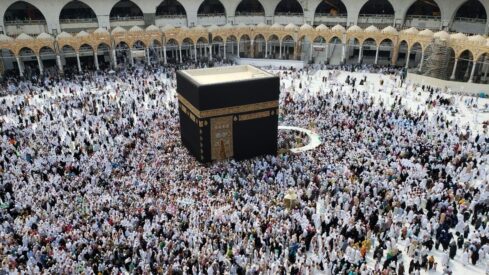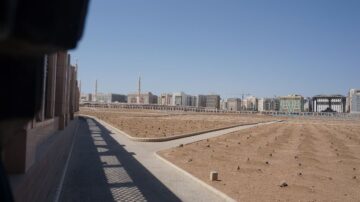The Hajj of a Woman without a Mahram
The principle in Sharia is that a woman is not to travel by herself; rather, it is obligatory upon her to have as her companion her husband or a mahram. This ruling is founded on what was reported by Al-Bukhari and others from Ibn Abbas (may Allah be pleased with him) that Allah’s Messenger (pbuh) said: “A woman is not to travel except with a mahram and a man is not to enter upon her except if she has a mahram.”
And it is narrated by way of Abu Hurairah that: “It is not permissible for a woman who believes in Allah and the Last Day to travel a distance for one day and one night without a mahram with her.” Abu Saeed narrated that the Prophet (pbuh) said: “A woman is not to travel a distance for two days without her husband or mahram with her.”
And Ibn Umar narrated that: “She is not to travel for three nights, except if she has a mahram.”
Apparently the differences in narrations are because of the different petitioners and questions in which answers were given to them. Abu Hanifah preferred the last Hadeeth of Ibn Umar and was of the opinion that a mahram is not needed except in travels in which prayers are shortened (also reported by Ahmad). These hadith include all types of travel, whether or not it is necessary, like visiting, trading, seeking knowledge, or anything else.
The basis for this ruling is not an evil assumption about the woman and her manners, as some people unreasonably think, but it is to take care of her reputation and dignity. It is to protect her from the desires of those who have diseased hearts, from the assault of a rapist or a thief. And this is even more so in places that the traveler must pass through, like deadly deserts, in a time when there is no sense of security, and where the places are unpopulated.
But what is the ruling on a woman, who does not find a mahram to accompany her in a legitimate travel, whether obligatory, preferred or permitted? And there is within her reach a group of protective men, or trustworthy faithful woman, and the streets are safe? The jurists have researched this topic whenever they discussed the obligation of hajj upon women, and they kept in mind the Messenger’s (pbuh) prohibition of a woman traveling without a mahram. Their thoughtful opinions include the following:
- Among them are those who hold on to what is apparent from the mentioned hadith, they prohibit traveling without a mahram, even for the obligation of hajj. And there is no exception to this rule.
- There are those who make an exception for older woman with no desire, as has been transmitted from AI-Qaady Bin AI-Waleed Al-Yaajee, from the Maliki madhab. It is especially for women in general if we look at the meaning as was said by Ibn Daqeeq AI-Eid.
- Some of them make the exception that as long as the woman is with trustworthy and faithful women, then the travel is permissible. Furthermore, some conclude that it is enough for just one free trustworthy and faithful Muslim woman.
- And some concluded that the roadway must be safe. This is the opinion that was chosen by Sheikh ul-Islam Ibn Taymiyyah. He mentioned that Ibn Muflih in Al-Faroo’ said: “Every woman can perform hajj without a mahram as long as she will be safe.” And he said: “This is directed towards every travel in obedience… Al-Karabeesee transmitted this from Ash-Shafi’i pertaining to the supererogatory hajj. And some of his companions also said this about supererogatory hajj and about every travel that is not obligatory, like visiting and trading.”
Al-Athram transmitted from Imam Ahmad: “A mahram is not a condition in the obligatory hajj.” His justification for this is his saying: “Because she goes out with women, and with all those whom she is safe with.”
Ibn Sireen even said: “With a Muslim it is okay.”
Al-Awzaee said: “With a just people.”
Malik said: “With a group of women.”
Ash-Shafi’i said: “With a trustworthy faithful Muslim woman.” And his companions said: “By herself if there is safety.”
AI-Haafidh Ibn Hajar said: “What is well-known with the Shafi’is is that it is conditional that there be a husband, mahram, or trustworthy faithful women.” And in another saying: “It is enough for just one trustworthy faithful woman.” In a saying transmitted by Al-Karabeesee, authenticated in Al-Muhadhab, is that she can travel by herself if the streets are safe. If this is what was said about traveling for hajj and umrah, then this ruling should be uniform concerning all types of travel, as some scholars have agreed.
The purpose here is to safeguard the woman and protect her, which is fulfilled by knowing that the roadway is safe and that trustworthy faithful men and women are present.
The proof of the permissibility of a woman traveling without a mahram is incumbent upon there being security and the presence of trustworthy faithful people. What was reported by Al-Bukhari is that during the final hajj of Umar Bin Al-Khattab (may Allah be pleased with him), he gave permission to the wives of the Prophet (pbuh) to perform hajj. So he sent with them Uthman Bin Affan and Abdul Rahman. Umar, Uthman, Abdul-Rahman Bin Awf and the wives of the Prophet (pbuh) all agreed to this. None of the other companions rejected what they did and therefore this is considered to be consensus.
Second is what was reported by AI-Bukhari and Muslim from the Hadeeth of Ada Bin Haatim is that the Prophet (pbuh) told him about the future of Islam, it’s spreading, and its light going throughout the earth. Among what he mentioned is: “The day is near when a young woman will travel from AI-Hira (a city in Iraq), going to the Sacred House with no husband accompanying her. She will fear none but Allah.” This information does not only prove that this will happen it, but proves its permissibility, because it was mentioned in a phrase praising the spread of Islam along with its sense of security.
Here I will state two additionally important precepts. The first is that the basis of rulings on acts of dealings is to focus on their meanings and purposes. This is the opposite of rulings on acts of worship. This is because the basis of acts of worship is just to worship and obey, before focusing in on their meanings and purposes, as was firmly established by Imam Ash-Shatiby, who clarified this and verified it with proofs.
The second is that prohibited things are not permitted except if there is a dire need. And things that are prohibited so that they can be an obstruction to evil are permitted during times of need. And there is no doubt that the prohibition of a woman traveling without a mahram is prohibited so that it can be an obstruction to evil.
It is incumbent upon us to look at traveling in our time. It is not like how traveling was in the past. It is not filled with the dangers of the waterless deserts, encounters with thieves, highway robbers, etc. Now traveling is by various modes of transportation that usually gather large amounts of people at a time, like ships, airplanes, buses or cars that travel in caravans. Thus, this provides plenty of confidence and reliability, removing feelings of fear for the woman, because she will not be by herself in any place.
This is why there is no objection for the woman to perform hajj within this safe environment, which will provide all the necessary security and contentment. And with Allah is the success.
Getting Married or making Hajj
The Question is that, a father wants to make Hajj for the first time but he has a son unable to handle marriage expenses, what should come first making Hajj or assisting his son to get married?
A father is not required but encouraged to assist his son to get married, however Hajj is mandatory and one of the pillars of Islam. The father should make Hajj first because it is mandatory especially the first time. Similarly, if the father is a situation either to make Hajj or prepare his daughter for marriage, he should make Hajj.
The majority of scholars support the view of make Hajj immediately and not postponing it. The son should wait and be patient as Allah SW has said in the holy Quran “let those who find not the wherewithal for marriage keep themselves chaste, until Allah gives them means out of his grace.” 24:33 the prophet PBUH has encouraged young people to get married, but if they can’t He PBUH encouraged them to fast or seek to merry from families who makes it easy on them. There are Muslim women who would agree to merry with humble dowry.
If the young man is able financially to merry or make Hajj, what should he do? If the person is able to resist his desires, he should make Hajj before getting married because Hajj is mandatory, but if he can’t resist he should get married in order to protect himself from committing mistakes. Here marriage becomes mandatory, and Hajj can be postponed. If the father has already made Hajj once, then the choice is his to make it on more time, or assist his son or daughter in getting married.
The Hajj of the Newly Widowed Muslima
As for the widow who went to perform hajj during the ‘Iddah period from the death of her husband, is her hajj accurate and valid or not?
Attya Sakr looked at this question from two angles. First the Mahram, and the rights of the deceased husband.
With regard to the deceased rights, she should have the Eddah. Whenever her Eddah is over she can travel. However, traveling in the Eddah period has two aspects. First, the Eddah, and obligatory nature of Hajj. Scholars have differed on this matter. The four schools of thought stated that she should stay at her house and not go to Hajj because she is considered as “unable” under this condition, and Hajj is not prescribed on “unable people” and she can make Hajj in a latter year. Some went on to say that if she already started her trip, and the news reached her of her husband’s death she should return if she has not reached the Mekat yet. The Mekat is the place of Ihram making. Raffia’s Bint Malek narrated that the sister of the Saeed Alkuhudry asked the Prophet PBUH to leave her husband’s house after his death and go to her family’s, he did not allow her to do that. Dawud Althahiri allowed her travel during the Iddah period.
To conclude, in the case of making Hajj for the first time it is Ok because the opportunity may not be available in a latter stage, however, if she already made Hajj then she should not make Hajj during the Iddah period.
Women’s Period during the Hajj
What would a women do if she is surprised by the period during the Hajj?
Aisha narrated that, the Prophet PBUH came to her, he found her crying, and he said you have your period. I said, yes. He said, Allah SW has prescribed this for the daughters of Adam, do whatever other pilgrimage do except Tawaf until you wash.” Therefore, she can stand in Arafa, make Sa’ i between Assafa and Marwa, and through the Jimar. The things she is not supposed to do are: praying, Tawaf, reading Quran, staying at the Mosque, touching the Quran, and carrying it. However, she can make Takbeer, and make Tassabeeh or remembrance of God. I think, that if women are surprised by the period she should wash, and do the same hajj activities as others do. Then when the period is over she should do the Tawaf. Another related point, I don’t see a problem in taking types of medicines that may postpone periods until Hajj is over.
A Woman should seek her Husband’s Permission for Hajj
Question: Can a Muslim woman perform Hajj without the permission of her Husband?
Answer by Sayyed Sabiq: It is desirable for a woman to seek her husband’s permission for the prescribed Hajj. Then if he grants her the permission she may leave for Hajj; in case he refuses to give permission, she may still proceed for Hajj, for a husband should not forbid his wife from performing obligatory Hajj. It is an obligatory act of worship. It is unlawful to obey anyone in something that involves disobedience to Allah. A woman should perform obligatory Hajj as soon as possible, just as she should offer her prescribed daily prayers at their earliest prescribed times. In either case a husband has no right to prevent his wife from doing what is her obligatory duty.
The same applies when a wife has vowed a Hajj, because it is obligatory like the prescribed Hajj. In the case of supererogatory Hajj, however, the husband may prevent his wife, and the wife must obey her husband. This is supported by a hadith reported by
Ad-Daraqutni on the authority of Ibn ‘Umar who narrated that while speaking about a wealthy lady whose husband had refused to give her permission to perform Hajj, the Prophet (peace be upon him) said:
“She must not go for Hajj except by her husband’s permission.”
Sexual Intercourse Nullifies Hajj
Question: Is there any bad consequences on Hajj if a pilgrim did sexual intercourse with his wife?
Answer by Sayyed Sabiq: Ali, ‘Umar and Abu Hurairah issued a verdict concerning a man who had sexual intercourse with his wife in the state of ihram. In this verdict they said: “They both must complete their Hajj, but must also make another Hajj the following year and slaughter an animal.”
Abu Al-‘Abbas At-Tabari said: “If a muhrim had sexual intercourse with his spouse before the first tahallul” from ihram, regardless of whether it was before or after ‘Arafah, it will invalidate his Hajj. Such a person, however, must continue performing the rest of his Hajj rites. He must slaughter a camel and make up for his Hajj the following year.”
If the wife was in the state of ihram and she accepted what her husband did, she must continue the performance of Hajj, but must also make it up the following year, and besides, according to the majority of the scholars, must also offer a sacrifice. According to ‘Ata some scholars hold that the husband and wife may offer only one sacrifice.
In his commentary on hadith, Sharh Al-Sunnah, Al-Baghawi said – and this is the more famous of the two sayings of Ash-Shafi’i – that a man is required to pay the penalty for sexual intercourse on a day in Ramadan. Such a couple should keep apart (Doing so is mandatory according to Ahmad and Malik, but the Hanafi and Shafi’i schools take it as a recommendation) when they go to make the next Hajj (in compensation for the first one) lest they should repeat what they did before.
If such a man is unable to slaughter a camel, then he may slaughter a cow. If he cannot afford it, then he may slaughter seven (7) sheep. And if he is even unable to do that, then he may estimate the value of the camel, and distribute food of that amount among the poor and needy people, so that every person receives one mudd. If he is unable to do so then he should fast a day for each mudd thereof.
The scholars said: If a muhrim had sexual intercourse with his spouse before the Day of ‘Arafah, then his Hajj will be null and void, and he will have to offer in sacrifice a sheep or one-seventh of a she camel. But if he did so after the Day of ‘Arafah, his Hajj will not be invalidated, but he will have to slaughter a camel.
In case such an act is committed by a qarin pilgrim – one combining Hajj with ‘Umrah – he must make up for this Hajj qarin with another Hajj qarin and offer another sacrifice just as the pilgrim performing Hajj only does.
Sexual intercourse, if it happens after the first break in ihram (following throwing pebbles and shaving one’s head at Mina), does not invalidate Hajj nor does it require Hajj to be repeated later. This is the view of most of the knowledgeable people. But others hold that making up Hajj and offering a sacrifice is mandatory.
This is the opinion of Ibn ‘Umar, Al-Hasan, and Ibrahim. There is also disagreement as to what animal is to be offered in sacrifice; a sheep or a camel?
Ibn ‘Abbas, ‘Ikrimah, and ‘Ata are of the view that it must be a camel; this is also one of the opinions of Ash-Shafi’i.
According to a second opinion of Ash-Shafi’i, a sheep must be offered in sacrifice. Malik agrees with this second opinion.
A muhrim, who had a wet dream or ejaculated by thinking about or looking at a woman, incurs no penalty, according to the Shafi’i school.
These scholars, however, hold that if one kisses or touches his spouse with a sexual desire, he must offer a sheep in sacrifice regardless of whether he ejaculates or not. Ibn ‘Abbas holds that such a person incurs penalty and he must slaughter a sheep.
Mujahid said: “A man came to Ibn ‘Abbas and said to him: ‘such and such a woman came to me with all her make up while I was in the state of ihram. I could not control myself, and ejaculated. (What should I do?)’ Ibn ‘Abbas laughed until he fell on his back and said: ‘You are very lustful. There is no harm. But you must slaughter a sheep. Your Hajj is complete’.” This was reported by Sa’id Ibn Mansur.
Authorizing Someone to Perform Hajj on Behalf of Someone Else:
Sheikh Qardawi: The basis of acts of worship, specifically the physical acts of worship, is that a person performs them himself. If one has not performed them himself, then it is allowable for his children to perform them for him. The Prophet (pbuh) said, “Your children are part of your earnings.” The child of a person is part of him, and he is a part of the child’s actions. It is considered as an extension for him after he dies, just as it has come in the Hadeeth: “If the son of Adam dies, his actions are ceased except three: A continuous charity, knowledge which benefits others, or a righteous son supplicating for him.”
So the righteous son is an extension of the life of his father and an extension of his existence. Understanding this it is then permissible for the children to perform hajj in lieu of their father. If they do not perform it, it is then allowable for them to send someone else to perform it for them. There was a woman who came to the Prophet (pbuh), she said that her father was an old man and was not able to handle the journey and so the obligation from Allah concerning the hajj was not performed by him and he later died. Should she perform hajj for him? He said: “Yes. Perform hajj for him.” Another woman – as was reported in the Hadeeth of Ibn Abbas – asked the Prophet (pbuh) if she should perform hajj for her mother who vowed to perform hajj for the sake of Allah but had died. He said: “Perform hajj for her. Have you seen that if she had a debt, you would have paid for her?” She said: “Yes.” He (pbuh) said:
“So pay it. For Allah has more right to be paid.” In another narration is:
“For the debt to Allah has more right to be paid.”
So, just as the son is to pay the debts of his father in the matter of concerning wealth, the same is to be done for spiritual matters and matters of worship. Therefore either the daughter or the son can perform hajj for their father or at the least they can entrust somebody to perform hajj for him. But the one that will do this must depart for hajj from the deceased’s country – the country that the deceased would have departed from. If he was from Qatar for example then the person must depart from Qatar and nowhere else. If he was from Ash-Shams, then the person departs from Ash-Shams, and so on. And this should be done unless the financial situation of the deceased is incapable of supporting this – that is if the hajj expenses will be paid by that source. Whatever is possible should be done. And if the son will authorize somebody, using his own money, to perform hajj on behalf of his father, then this should also be in accordance to whatever his financial situation will allow.
Finally, whoever would perform hajj on behalf of someone else is required to have first performed hajj for himself. And Allah knows best.
An Interrupted Hajj for Medical Reasons
Question: He made four Tawaf around the Ka’bah, and then suddenly fainted and was taken to a hospital. After treatment he left toward home, and did not finish the seventh rounds around the Ka’bah. Is his Hajj invalidated?
Answer by Attya Sakr: the majority of scholars said that making seven Tawaf is a pillar of Hajj because the prophet PBUH said “take your rituals from me”, and he did seven. It is like the prayer if you miss Rakaa, you will miss the prescribed prayers. The Prophet said “that Tawaf if like prayer but you are allowed to talk, any one who talks should only talk about what is “good” However, Imam Abu Hanifah stated that the Tawaf is four times or a -Ashwat-, the rest which are three are recommended but with a sacrifice. Accordingly, I would say that your Hajj is accurate, but you still have to make a sacrifice.
Using Perfume during Hajj
Question: When Hajj comes in summer times, sweating increases and the body’s smell changes is it Ok to shower, and use perfume?
Answerby Attya Sakr: One of the Hajj features is to see pilgrimage riding themselves from earthly types of beauty, perfume, or another appearance contradicts the meaning of humbleness, and equality. Thus showering, and using perfume have been made possible before the Ihram even if the smell of the perfume would last after, for a longer period. Using perfume is not allowed because the prophet PBUH asked those who wore it to wash it. There is also no reservation on using soap that has some fragrant with the objective of cleaning one’s body not to show off. It is also ok to smell fruits, mint, basil, etc. therefore, if a person used perfume or colon and he/she know the prohibition then the Fidya is mandatory. However, is he or forgotten and used colon or perfume then it is not required. The Fidya her is slaughtering a sheep, or feeding sixty poor people.

















